Written by Melissa DeSa
On May 6, 2019 about 3,600 little corn seeds were planted in greenhouse trays. Normally corn is direct seeded in the field, but this corn was special and needed some extra protection- plenty can go horribly wrong for a little seed in the open field. Some of the seeds were dated back to 1997 and with the possibility of low germination, we’d have open gaps and wasted space in the field if we took the chance. They needed a loving and hopeful touch to wake them up after such a long rest.
This is the Dudley Family Corn story.
It is presumed that among the precious seeds and plants the Dudley family brought with them when they moved to Newberry, Florida from South Carolina in 1859, were those of this white field corn, a very hearty variety that thrived in the Southeast’s hot and humid environment. It was usually planted in June when the spring rains came, according to the old timers.

Variations in the Dudley corn. Selection is made for long ears with straight rows and dented kernels.
Myrtle Dudley, the last remaining granddaughter inhabiting the original but dilapidated family farm, in 1983 had gifted the farm to the Florida State Park Service upon her death, with the stipulation that the farm be operated as an example of a working farm during the historic time period of post Civil War. While the corn was still being grown at the farm, Myrtle had allowed Hubert Davis, a friend and neighbor to come to the corn crib where she said “You can take what you want but don’t ask for it again”. Meaning: grow it out yourself and be sure to save the best ears for next year’s seed.

The corn crib at Dudley Farm.
This corn was a treasure, adapted over time by the desires of the family, and shaped by the demands of the land and climate. Plants are incredible that way, changing and responding to their environment alongside their keepers, year after year. But the Dudley Family Corn is endangered. It’s a tragedy, after so many years of careful tending and adaptation, to lose something this valuable. So we had great hope that these little seeds planted on May 6, would thrive and produce more seed this year.
Five years ago, is when we learned about its plight.
Our farmer friend Angie Minno told us about this imperiled corn she was growing, and gifted us some seed. We grew a few hundred plants in Rochelle in 2015, and gave some of that seed to Bricky Way at Morningside Nature Center, for their historic garden. Then we learned that our friend Karen Sherwood was still growing it, and she had actually lived and worked at the Dudley Family Farm back in the day! She then told us about Sally Morrison and Hubert Davis, other recent human hands involved in stewarding this corn over time, who also had deep connections to the Dudley land and the crops grown there.
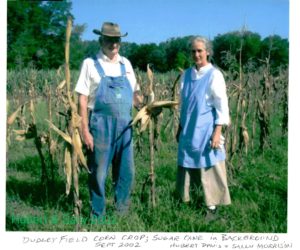 Prized for its hardiness, flavor, and adaptability to the land, it remained in their care after the farm was turned over to the state park system when unfortunately the seed was lost in a freezer malfunction, and subsequently not tended for quite some time. Corn may be easy to grow, but saving its seed takes a bit more work and dedication.
Prized for its hardiness, flavor, and adaptability to the land, it remained in their care after the farm was turned over to the state park system when unfortunately the seed was lost in a freezer malfunction, and subsequently not tended for quite some time. Corn may be easy to grow, but saving its seed takes a bit more work and dedication.
So with the last of the seed in hand (about 9,000 little seeds to be exact) spread out, isolated, and greatly imperiled- Karen, Melissa and Sally gathered to pool the remaining seed and come up with a strategy. It felt like a total hail Mary as we nervously counted out the last remaining seeds and divided them up.
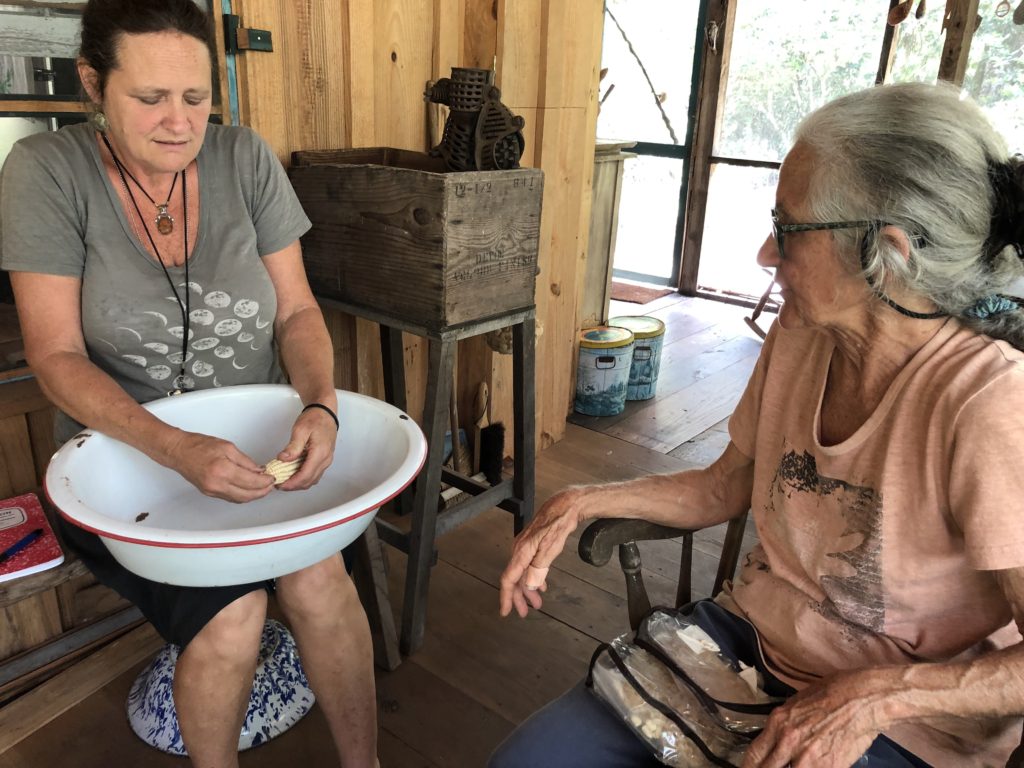
Karen Sherwood (left) and Sally Morrison (right) shelling and sorting through old Dudley Corn seeds and ears.
Weeks later, several caring hands pitched in to plant about 3,600 little seedlings into sandy Florida soil at The Family Organic Garden in Gainesville, right before a major heat wave and drought struck our area for weeks. To say we lost a few nights of sleep would be an understatement. Fortunately they made it through mostly in good health, confidently waving their long and lustrous leaves in the wind, sending out healthy tassels and receptive silks through the season. This corn knows this place. But things have changed.

Melissa setting out plants at The Family Organic Garden. Populations were identified for tracking later on, i.e. Karen’s seed, Sallys 1997 seed, and more recent ones. The ultimate goal was to mix them all up for genetic diversity and integrity. Photo credit: Isabella Guttoso.
The weather is hotter earlier and longer, and much more erratic. Traditional planting times that allowed for natural irrigation, and a dry down time for the ears when humidity is typically lower, are now practices we grapple with. It was so hot (over 100F for days) when the pollen was blowing around, that some may have been damaged resulting in much lower pollination rates, and thus fewer ears. It got some rust later on, a pretty common corn disease, that some modern cultivars have resistance to. Early planting is a strategy to avoid it, but then you also run the risk of cross-contamination with any nearby growing sweet corn which is typically planted earlier as well.
We encountered a few ears with smut. This contagious corn disease can really affect the harvest, but it’s also a high end delicacy! If you can get past the weird look of it and repeat to yourself, “It’s a corn truffle, it’s a corn truffle”, you will be delightfully surprised at its unique flavor. Think mushroom meets corn meets aged cheese. So while we were excited to be able to eat corn truffles (also called huitlacoche), we panicked a bit when we saw it. Fortunately it did not spread too far. We pulled them all off and ate them!
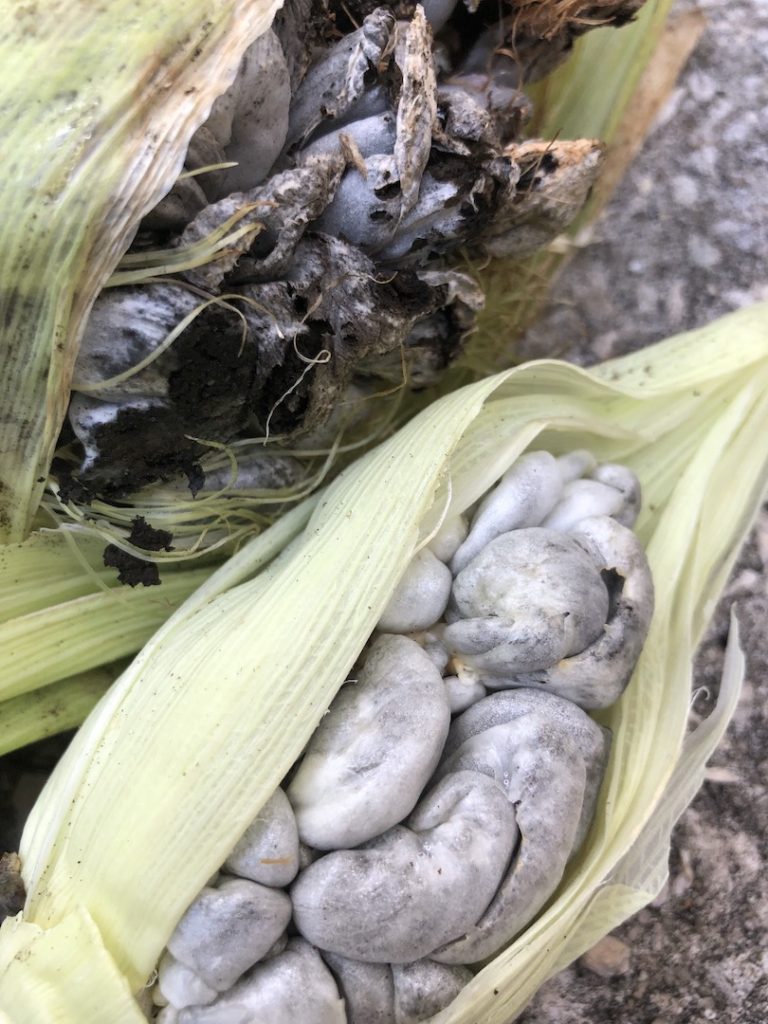
Corn smut in all it’s curiously odd glory.
The farmers all said we should have planted earlier. March, they said! March?!? But this corn has always been planted around the 4th of June. March!? Early planting will reduce disease incidence and possibly ensure a better harvest, by having it tassel before it’s too hot. But it also means the corn will need to be irrigated, may cross with neighboring sweet corn, and may have trouble drying down when it matures at the end of summer.
But as we gathered together to shuck and sort the ears we managed to harvest after all the challenges of the season, we hopefully strategized the next 5 seasons- the time we think it will take to get this corn back in good shape. Out of 3,600 seedlings, we selected only several hundred decent ears for next year’s planting. Some died early on, some were pulled before tasseling because they were not strong, some were not pollinated, and many were just not prime examples of what we know the corn to be. We’ll eat the rejects, because you know what they say, “save the best and eat the rest!”
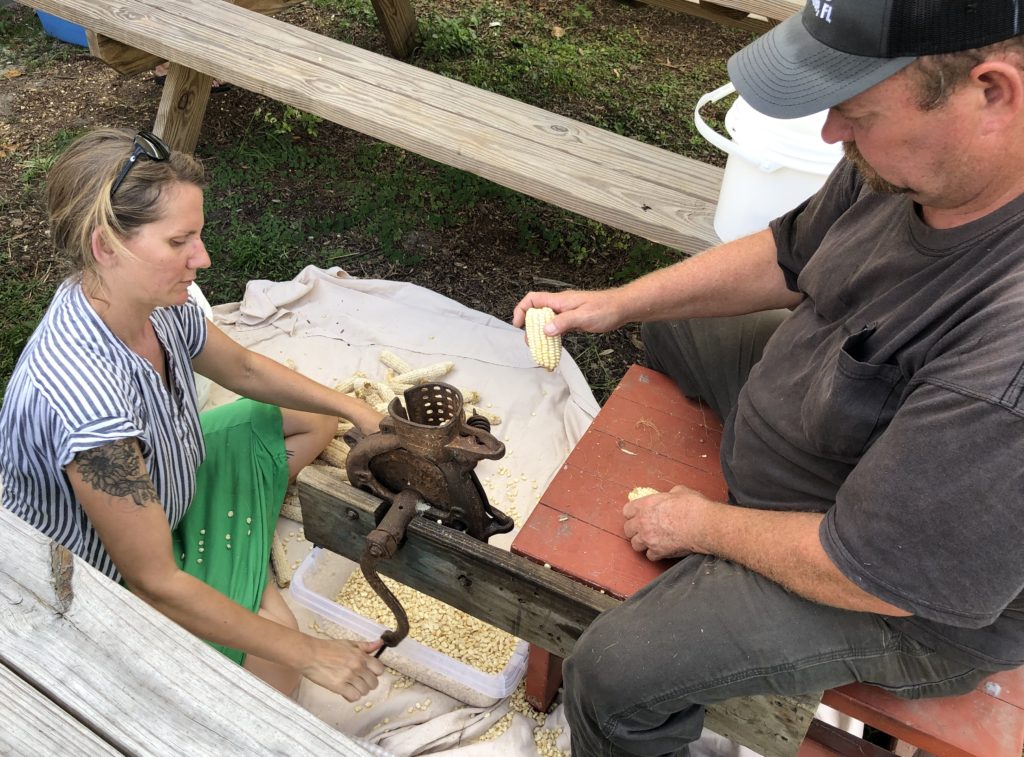
Melissa and John Beville shelling the corn through his family’s own heirloom hand corn sheller!
We’re looking forward to the next 5 seasons and beyond, and hope that one day Dudley Family grits and cornmeal are on the local market, and anyone that wants to grow it themselves will have plenty of seed.
Thank you Karen Sherwood, Sally Morrison, Ashely Rella, Sarah Sterling, Jesse Wilson, Mary Santello, Debbie Prizzia, John Beville, Richard Pushaw, Angie Minno, Brickman Way, Franklin Percival, Isabella Guttoso and of course Jordan Brown for entertaining the idea at all of “Melissa’s Little Corn Project” on his land. If anyone has more stories about this corn, or is interested in helping us with this project, please contact Melissa! 352-260-4458 or email (preferably) melissa@workingfood.org.
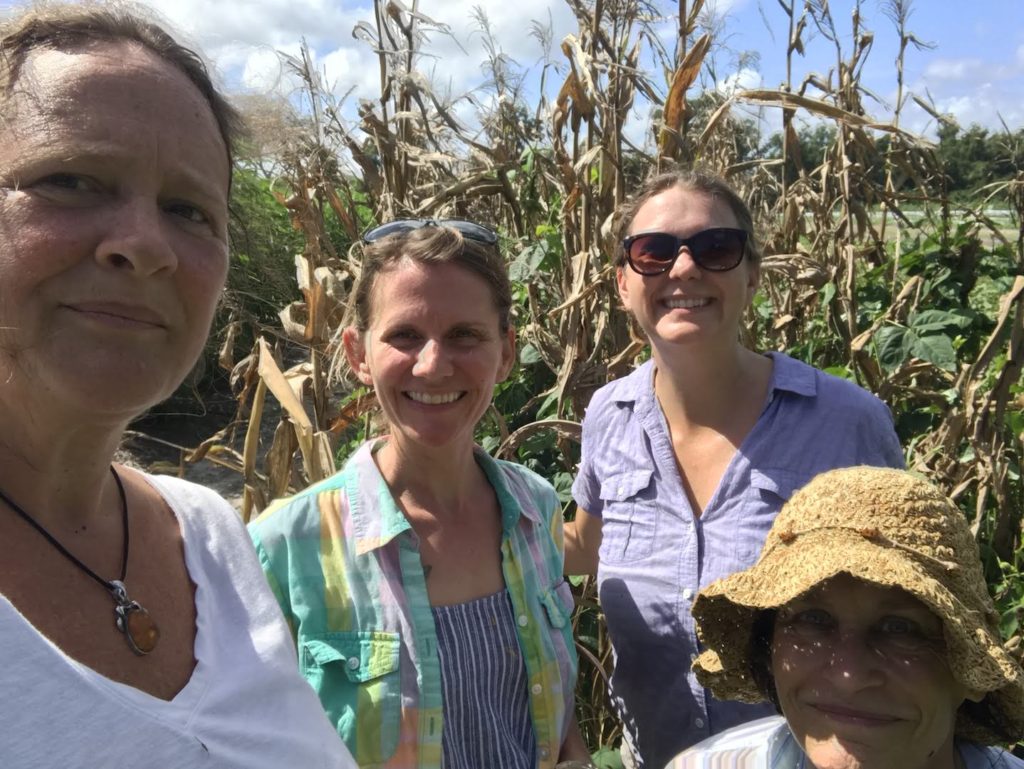
Left to right: Karen Sherwood, Melissa DeSa, Sarah Sterling & Mary Santello.







